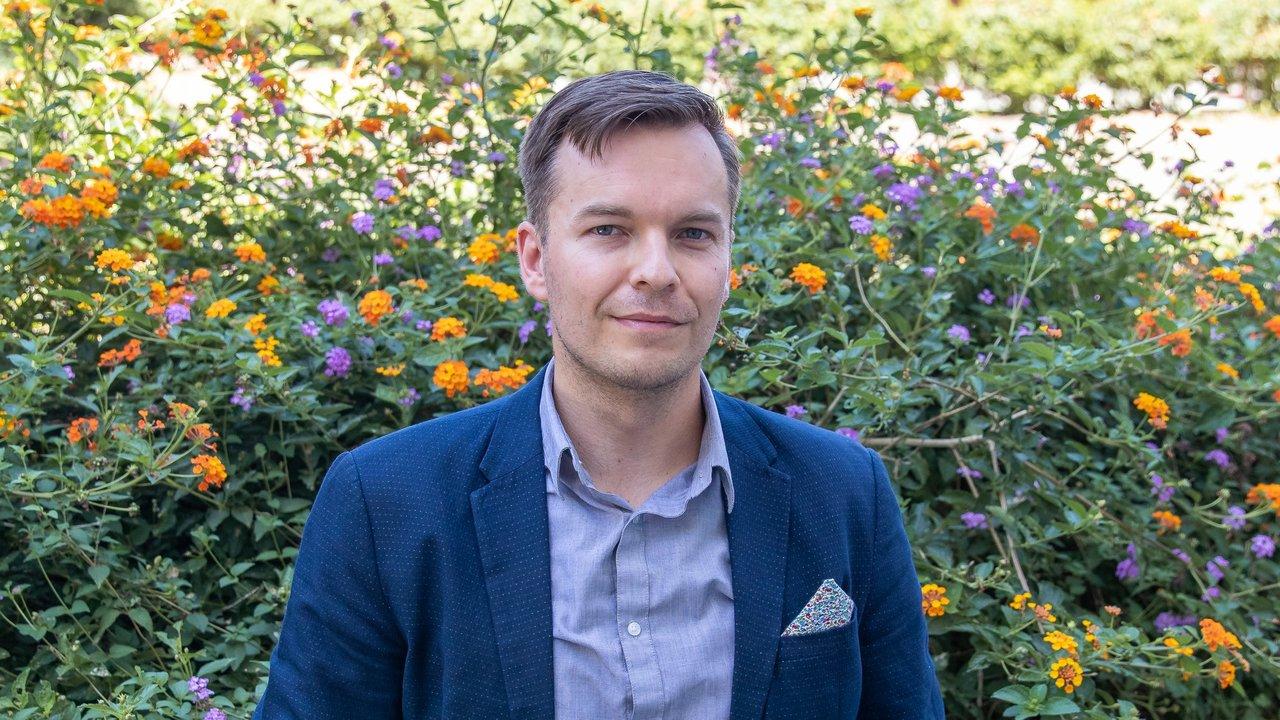
Jonathon Schofield: Human-machine translator
Humans and machines communicate using different languages, and like any language barrier, it can be reduced through mutual understanding and translation. New mechanical and aerospace engineering assistant professor Dr. Jonathon Schofield aims to break down this barrier by improving communication between humans and robotic rehabilitation technologies.
Specifically, Schofield studies how people with amputations communicate and respond to advanced prosthetic limbs that interact with their nervous systems. The goal is to get the two to work together seamlessly and for the patient to feel as though the prosthetic device is an integrated part of their body like the original limb.
“To do this, we need to look at how much a patient perceives the device is a part of them, and if their brain processes controlling the device as though it’s a part of the body,” he explained.
Effective cooperation between humans and prosthetic devices requires two-way communication. First, the prosthesis needs to understand and respond to the user’s intentions, which is often done by measuring nerve and muscle activity. The prosthesis must then tell the user that it’s doing what they asked by either stimulating the nervous system to induce sensations of touch and movement or simply providing vibration, flashing lights or other forms of basic feedback signals. Prosthetic devices are far from a one-size-fits-all solution, however, as patients may respond to some communication strategies differently than others.
“Humans are these highly complex, ‘squishy,’ individual things and all of a sudden you have to pair that to this precision-engineered piece of equipment,” he said. “Because people are so different, you have to engineer for so many different cases and unique circumstances. It’s the most exciting and the most challenging part of what I do.”
An Inverted Pyramid of Applications
Though he focuses on prosthetic devices, Schofield’s research on human-machine cooperation touches on much broader themes and wider-ranging applications.
“I think of it as an inverted pyramid,” he said. “Right now, a lot of my work is in this advanced, experimental robotics realm, but I think the impact is huge—this is a human interacting with a machine and the two of them are cooperating to achieve a task. This is happening more and more in our daily lives and in so many other applications beyond just prosthetic limbs.”
To Schofield, this means taking his expertise not just beyond the MAE department, but also beyond the College of Engineering. He is excited to form relationships and collaborations with the UC Davis Health Center and the School of Veterinary Medicine to bring his work to a variety of applications and help those in need.
“My research requires me to be this kind of ‘glue’ that interfaces with all these various branches of expertise and bring the pieces together,” he said. “The work is so interdisciplinary that making an impact means being able to work with professionals in medicine, neurosciences and physiology, as well as engineering.”
Lucking into Engineering
Schofield first discovered engineering through his friend in college, an engineering student and a co-worker at a coffee shop who told Schofield about projects with vehicles and devices they were doing in class. The idea appealed to him, so he gave engineering a shot.
“I kind of lucked my way into it, but once I got going, I really enjoyed what I was doing,” he said.
Schofield received his B.S. in mechanical engineering at Lakehead University in Thunder Bay, Canada and spent two years working at a steel mill before going to graduate school at the University of Alberta. There, he received his M.S. in Biomedical/Structural Engineering and his Ph.D. in Biomedical/Mechanical Engineering before coming to the U.S. for his postdoctoral work at the Cleveland Clinic Lerner Research Institute.
In his spare time, he trains for endurance events such as long-distance running and triathlons, plays guitar and loves backcountry hiking with his wife.
Schofield’s first day at UC Davis was July 1 and he will start up his research group this fall. He hopes to establish himself as a researcher, mentor the next generation of pioneers and researchers and bring together many different fields to advance cooperation between humans and machines.
“There’s some really cool directions that this work could grow,” he said. “The ability to collaborate and grow is so important to what I do and I think UC Davis has a really awesome setup to do exactly that.”
